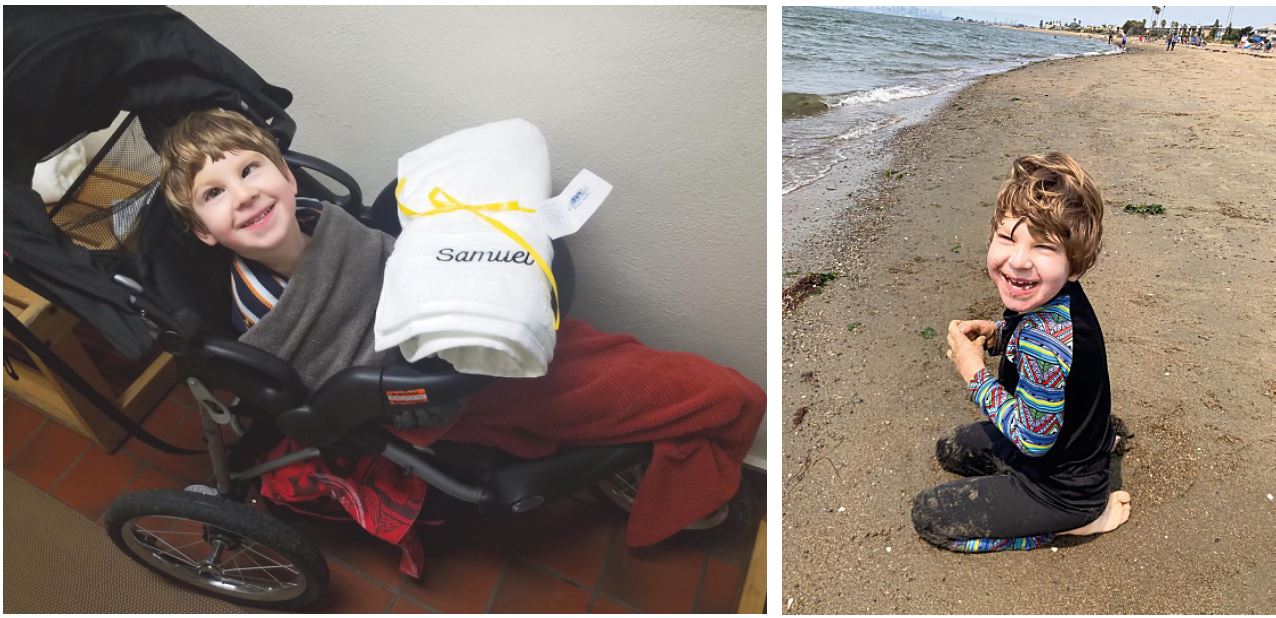WHAT NORMALIZES DISABILITY
My child Sammy is such an amazing teacher on so many different levels. He provides these incredible opportunities to reflect on yourself and the world around you.
But, at every level in our society, having a disability is perceived as "not normal." There's a standard of where your kid should be… and then there's a clearly defined line between what's considered normal and not normal. For any kid who is different or disabled, there's a fixation on "How do we fix this?" in order to achieve this sense of "normalcy." It's exhausting. I'd love for people who don't have any connection with people with disabilities to normalize it.
One of the many things inclusive swim programming for kids with disabilities does is provide this sense of normalcy that a lot of

WATER WORLD: (Above left) Sammy is all smiles after his swim; (Above right) Enjoying a day at the beach.
our families don't get to experience… and this starts with the locker room. Before class, all of the families who have kids with disabilities are in the locker room together, getting ready for class. tantrums, vocalizations, drooling, or even the presence of a wheelchair differentiates our families in shared spaces. It might even look alarming to some, but for our families, it's a normal part of the process of getting ready for the pool. Because we're in a group together, it's a supportive environment. It also creates opportunities for others in the locker room to see what our lives are like in this shared space, even when others may find it challenging.
Very rarely do families with kids who are disabled ever get the chance to get together or have the opportunity to hang out and talk. Having a shared experience with other families of children with disabilities makes it a safe place. Having interactions with similar kiddos and seeing caring volunteers work with our kids in this amazing, warm structured environment, it is a godsend.
CREATING OPPORTUNITY
What I like about the program we attend (SNAPkids) is that the approach to inclusive swimming is that it's not about meeting a certain goal or someone else's criteria. There's no finish line so to
speak; it's about how our kids can progress based on their abilities and have fun while they do it. Swimming in an inclusive program creates an opportunity for kids to work on developing swim skills without the heavy burden of having to achieve specific, structured goals. When Sammy was smaller, it felt like this structure and goaloriented focus was every second of every day. In the water it's "just" swimming. It allows a space for a kid whose routine is already packed with physical therapy and occupational therapy to go and be active, move with joy and freedom, interact with others, and have fun. A while ago, we had a routine where I'd take Sammy swimming and my partner would take the day off. There's a normalcy to being able to drop your kid off to do an activity, and then getting to sit back, watch, and enjoy.
It's important that Sammy gets to develop his own relationships with the volunteers and other kids in the water. His weekly swim is one of the few moments outside of school where he spends time with other people and is wholly independent from his parents doing his own activity and enjoying his own autonomy separate from us. Swimming has also given Sammy a newfound body awareness and it's just been an incredible experience. And to be able to find a space and have that all navigable for people in wheelchairs and for kids of all abilities is amazing.
The reality is that it's difficult to find activities that Sammy can participate in. One of the singular biggest losses for us during COVID was losing our in-person inclusive swim program. It was heartbreaking. It meant he lost out on the socializing that comes with his time interacting and befriending volunteers who work for the program, as well as precious time in the pool being able to move his body freely.
WHY SHOULDN'T KIDS WITH DISABILITIES SWIM?
When your child is given certain diagnoses, it feels like you're being dictated to what your child is capable of. You hear doctors say, "Your child is not going to be able to do this,or your child is not